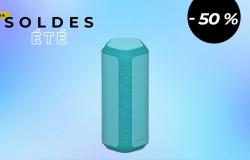In October 2023, the Grallet-Dupic farm distillery, which produces whisky in Rozelieures, in Meurthe-et-Moselle, announced investment in a new winery. The company has also increased its malt fermentation capacity and that of its distillery, with two new stills. Since May 2024, the installations have been delivered, allowing an increase to 550,000 liters of pure alcohol production capacity, compared to 190,000 liters previously.
A leap that is being made without additional water extraction, thanks to a dedicated installation, hopes Christophe Dupic, the owner of the 15-person company. “For a month and a half, we have not taken more water instantly. We had no requests in this area, we are not in a region subject to water restrictions, but we must always be one step ahead of the constraints that could arise in the future. The cost of water is also increasing.”he explains to The New Factory.
A system for reprocessing water during distillation
A new water management system has been installed (photo: Franck Stassi)
This system, which represents 15% of the total investment of 5 million euros (excluding alcohol stock), was designed in collaboration with Chaudronnerie Cognacaise for the new stills and Métallerie du Sud Lorrain, located in the Vosges. . The distillery uses water to carry out the fermentation stage, with malt infusion to extract the sugars.
Water is also consumed for washing the systems, as well as for cooling the stills. The hot water from the cooling of the stills is recovered. It is stored and reused to heat musts, sweet fermented juices, used to transform sugars into alcohol. The hot water is then cooled. This cold water, which passes through an exchanger, is used to cool the must.
“The water gets warmer again, and we store that water again. Then, this water will be used for mashing, that is to say the infusion of the malt.says Christophe Dupic, who is pleased to have been able to almost triple the production capacity, without consuming more water. An automated system of tanks, pumps, temperature probes, and piping, with pneumatic valves, has been installed.
Constant effluent volumes
“If we use less water, we remain constant on our effluent volume”, continues Christophe Dupic. Since 2013, the distillery has methanized its effluent, which allows it to be 80% self-sufficient in hot water. The offices, as well as five houses in the village of Rozelieures, are heated, and electricity is sold to EDF. Spent grains and livestock effluent from two associated farmers supplement the distillery effluent.
“The by-products of methanization, very rich in organic matter, are spread in the fields. In fact, we no longer buy potassium fertilizers and we have halved the volume of nitrogen needed for our barley fields.”underlines the head of the company, who is celebrating the tenth anniversary of the start-up of this installation.






